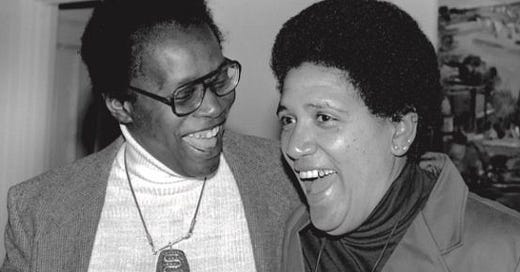When I was fifteen, I wrote my first love letter. Weaving together juvenile lust with gauche prose, I bore my soul with astonishing detail to a close friend. We exchanged stories about our immigrant parents in the corridors of our high school and dreamed about leaving Miami for a grittier, more cosmopolitan city like New York City and Paris. My affection was unrequited and continued to plague me for months. (Which feels like years for teenagers.) All in all, I was heartbroken, but the experience of writing a love letter, and formulating my admiration on paper taught me something important—how pivotal falling in and out of love was to my growth. Even in the context of a failed tryst, I started to think about different ways to love, of imagining how intimacy can be hedged out with friends outside of the romantic realm. Recently, I turned to Audre Lorde and a collection of letters she wrote a love note to her fellow poet friend, Pat Parker. On 6 December 1985, Audre remarked:
I have always loved you, Pat, and wanted for you those things you wanted deeply for yourself. Do not think me presumptuous—from the first time I met you in 1970 I knew that included your writing. I applaud your decision. I support you with my whole heart and extend myself to you in whatever way I can make this more possible for you. I hope you know by now I call your name whenever I can and will continue to do so. But you’re right, you don’t want to tie yourself up with so many gigs you don’t have good solid time to stare at the walls and read the words stitched into the cracks between the nail holes.
Pat Parker was an African American poet from a working-class background. Her mother was a domestic worker, and her father was a tire retreader. Like Lorde, she identified as a lesbian and organized in the Civil Rights movement, women’s liberation movement, and queer movement. As a poet, novelist, and activist, Lorde affirmed Black feminist politics by providing generous support and advice to other Black writers. Parker’s relationship with Lorde was platonic, a meeting of the minds, but also a reminder of how queer Black love could look like when we see and speak to each other.
In Sister Love: The Letters of Audre Lorde and Pat Parker, they provide poignant exchanges about their everyday life, their mental health crises, and their adoration for each other. Moving away from circumscription, Lorde gives us space to see how Black love comes with radical affirmation, even when living can be filled with exhaustion or constant atrocity.
But even more so, I was drawn to this community of women who provided care for each other, and who in real life, could shift the language of what love meant through transparent vulnerability. Letter writing has been a pivotal way that African Americans expressed their love. During slavery, the romantic love between Black people was taut, but not absent. In A Love No Less, Pamela Newkirk compiles fifty love letters written by African Americans over the course of two centuries. Whether they were (formerly) enslaved and or free, the text shows how people declare each other’s beauty and their joys of intimacy on the page.
Love is expansive, and there are a multitude of ways to express it. For me, platonic love is a love that perfectly encapsulates my lifelong relationships. But more importantly, it can give us the tools to heal emotional scars. Last year, Queer Love in Color by Jamal Jordan. This is a visual documentation of love, the compassionate care that is often missing from queer people. Yet, even more than that, this book—and the letters we write each other goes to show how love is central to shaping who we are.




